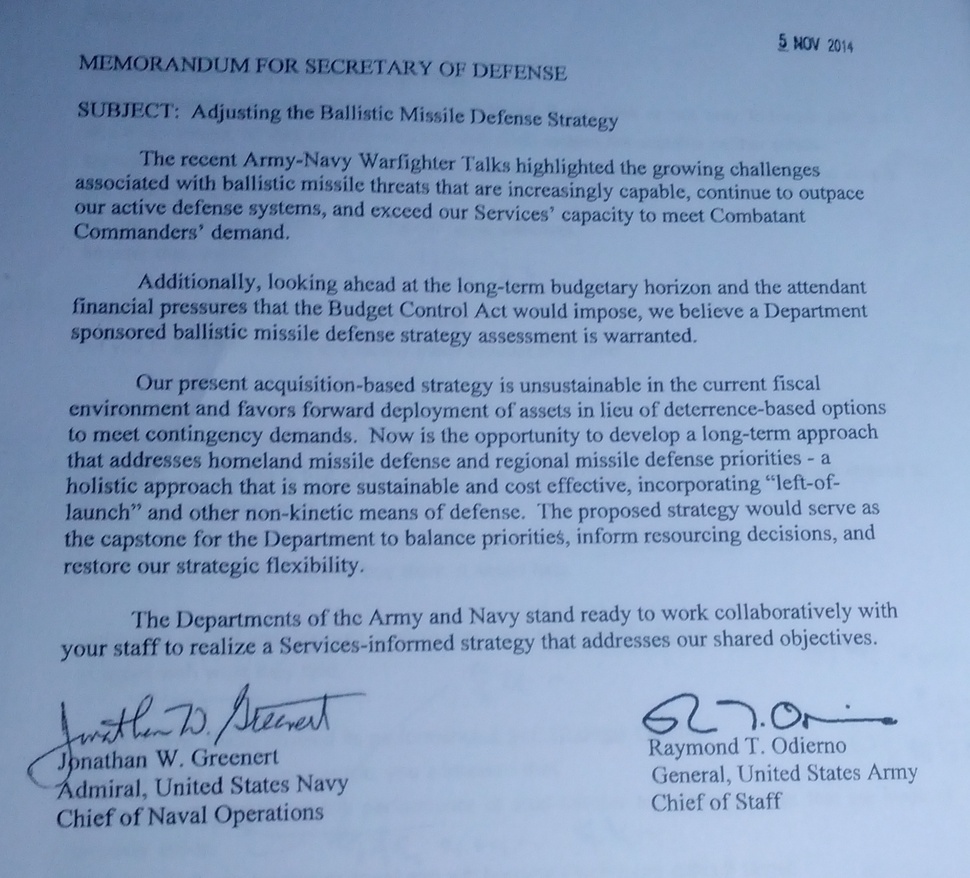 |
A single-page memo sent by Gen. Raymond T. Odierno and Adm. Jonathan Greenert, chiefs of staff of the army and navy, in November of last year, to Defense Secretary Chuck Hagel titled “Adjusting the Ballistic Missile Defense Strategy.” The memo - called an “eight-star memo” since it was written by two four-star generals - was leaked to the public in March of this year. |
Possible deployment of THAAD in South Korea could be related to US trying to overcome its own budget limitations
Various reports confirm a growing sense not only among the leaders of the US’s army and navy but also in the Missile Defense Agency (MDA) that the country’s current strategy for missile defense is running into limitations. Not only are sharp cuts in the defense budgets making it hard for the US military to cover the massive cost of developing and acquiring these weapons systems, but there are unanswered questions about their reliability.
This issue was first raised in the Pentagon by Gen. Raymond T. Odierno and Adm. Jonathan Greenert, chiefs of staff of the army and navy. In November of last year, the two chiefs sent a single-page memo to Defense Secretary Chuck Hagel titled “Adjusting the Ballistic Missile Defense Strategy.”
The memo - called an “eight-star memo” since it was written by two four-star generals - was leaked to the public in March of this year.
In the memo - which the Hankyoreh acquired on July 5 - the two chiefs argue that the ballistic missile threat of potential enemy states continues to grow and is indeed outgrowing the US’s current defense capabilities. “Our present acquisition-based strategy is unsustainable in the current fiscal environment,” the chiefs said.
“Now is the opportunity to develop a long-term approach that addresses homeland missile defense and regional missile defense priorities - a holistic approach that is more sustainable and cost effective, incorporating ’left-of-launch‘ and other non-kinetic means of defense.”
 |
US Missile Defense System |
“Left-of-launch” means stopping a missile while it is still on the launchpad, while “non-kinetic means of defense” are ways of neutralizing an enemy’s missile control through cyber warfare and electronic technologies such as jammers and lasers.
In sum, the two chiefs’ argument is that, because of limitations in the current missile defense strategy of intercepting enemy missiles in the air, the military needs to shift to a strategy of striking missiles or neutralizing the enemy’s ability to control those missiles before they are launched.
The Chief of Staff of the Air Force did not sign the memo, presumably because the air force is not very involved in missile defense strategy.
It turns out that the position of the army and navy leadership on this issue is shared by the Missile Defense Agency, which is responsible for US missile defense.
MDA Deputy Director Brig. Gen. Kenneth E. Todorov told reporters at an event held in Washington, D.C., on June 18 that the current US missile defense strategy is “not sustainable,” according to a report by military trade journal Breaking Defense.
With potential enemies acquiring more missiles, “you can‘t continue to buy these interceptors and have enough to necessarily intercept everything that’s out there,” the journal quoted Todorov as saying.
The interceptors needed for missile defense are much more expensive than the enemy missiles they are supposed to shoot down, and given the current financial circumstances, the US would be hard put to cover this cost.
“It‘s important to have a capability that the warfighter cares about and can rely on and has confidence in,” Todorov was quoted as saying. “We’ve got to do less procurement, more RDT&E.”
RDT&E stands for research, development, testing, and evaluation.
These comments mean that, as the performance of the current interceptors used in missile defense is being called into question, the US military should be focusing on improving performance instead of increasing acquisitions.
According to Breaking Defense, there is considerable support at the Pentagon for the suggestions in the two chiefs’ memo but implementing them will require getting Congress on board.
Along with this, some analysts think that the US military is trying to find a way around its limited defense budget by selling its weapons systems for missile defense to other countries.
This could be related to talk about deploying the THAAD (Terminal High-Altitude Area Defense) weapons system on the Korean Peninsula.
The US could claim that it would be deploying THAAD with US Forces Korea (USFK), not selling it. Past experience suggests, however, that THAAD would first be deployed with USFK and then later be sold to South Korea.
“We can’t afford to keep building. It is too expensive. What the US administration is hoping is that other countries like South Korea and Israel will buy them instead to keep production line open. So we can‘t afford them. That what is all Generals are saying. It is not sustainable. One solution is other countries buy them. It would help,” Philip Coyle, former assistant secretary of defense and director of operational test and evaluation, told the Hankyoreh.
Dr. J. Michael Gilmore, the current director of operational test and evaluation, met the Hankyoreh’s Washington correspondent during an event on June 25 organized by the Atlantic Council, a Washington think tank. When asked whether the memo by the two chiefs would affect the US’s deployment of THAAD on the Korean Peninsula, Gilmore said, “The two chiefs’ memo goes behind missile defense for defending the continental US and calls for a reassessment of our whole missile defense policy.”
While this would suggest that the memo could affect the deployment of THAAD on the Korean Peninsula, Gilmore declined to respond in detail since he is not responsible for this area of policy.
By Park Hyun, Washington correspondent
Please direct questions or comments to [english@hani.co.kr]





